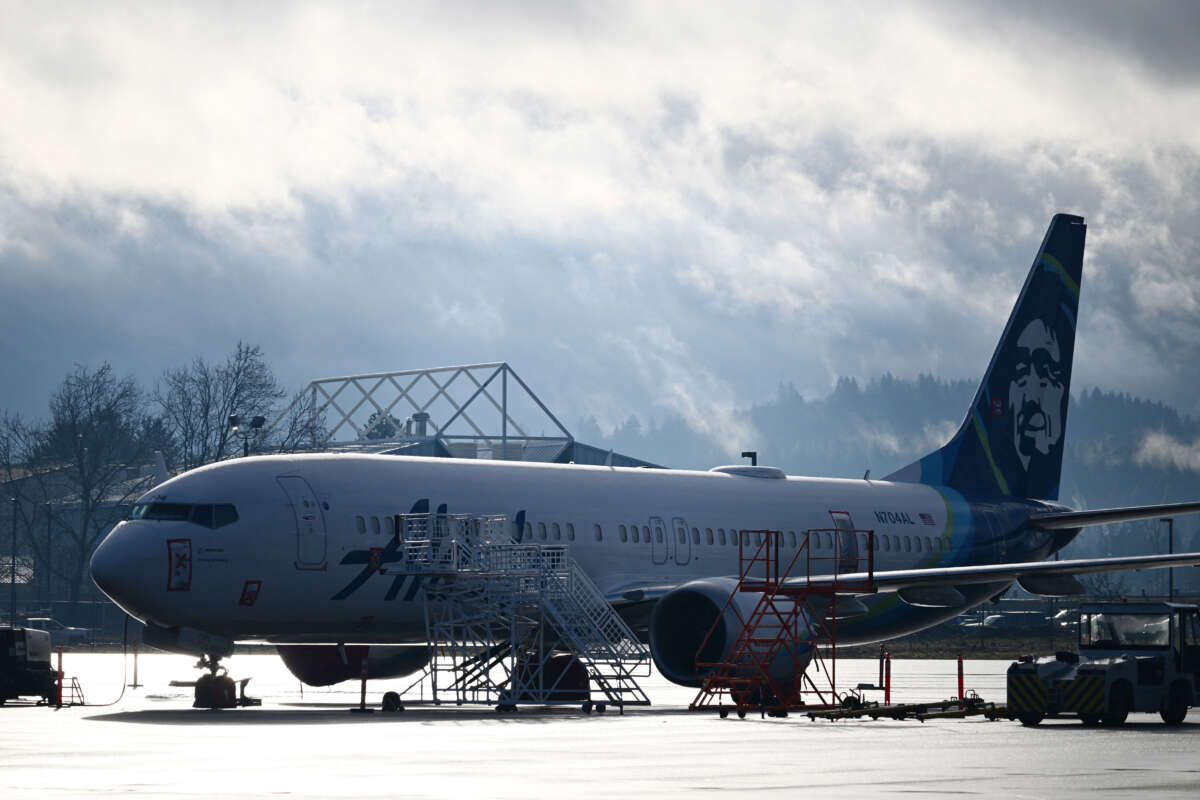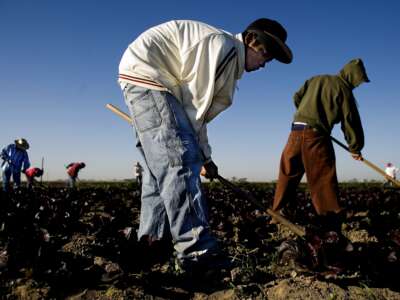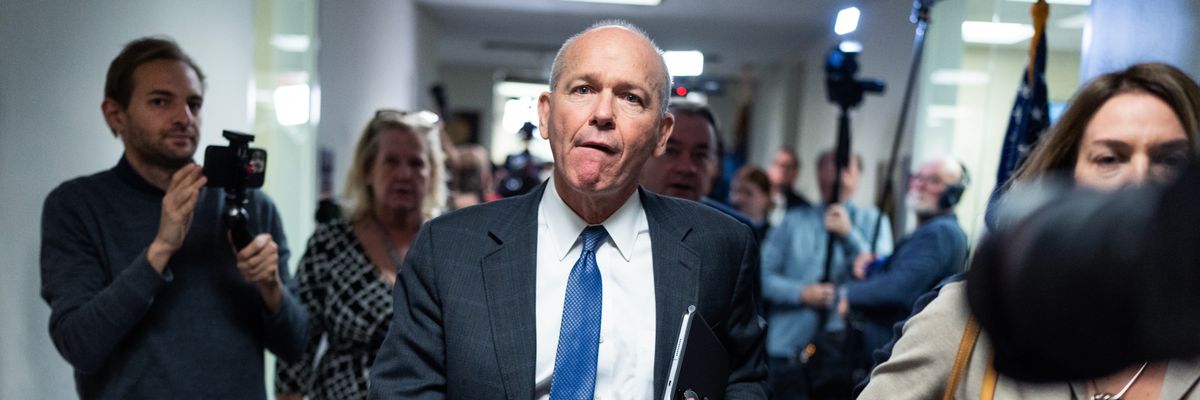.jpg)
Heads are rolling at Boeing, but new leadership doesn’t alter the labor conditions and profit motives that erode safety.
By Susan Kang ,
March 28, 2024

Alaska Airlines N704AL, a Boeing 737 Max 9, which made an emergency landing at Portland International Airport on January 5, is parked at a maintenance hanger in Portland, Oregon, on January 23, 2024.
PATRICK T. FALLON / AFP VIA GETTY IMAGES
In a dramatic turn of events, Boeing CEO Dave Calhoun announced on March 25, 2024, that he will step down at the end of the year following the company’s poor safety record, negative press and significant financial losses following the multiple safety problems with its 737 Max jets.
The now-infamous Alaska Airlines January flight, landing after a door panel blew off the plane mid-flight, led to the grounding of 171 737 Max jets (and subsequent mass cancellation of flights) and a Federal Aviation Administration (FAA) order to suspend production on the 737 Max. The National Transportation Safety Board has made the flight an investigative priority. Since then, more dramatic accidents have occurred, including a cracked windshield, plane fires, fuel leaks, stuck rudder pedals, at least one tire failure, and other problems.
The FAA announced in a February 26 report conducted by a panel of experts including government, industry, labor and academics over the past year, that Boeing failed 33 of 89 safety audits of its 737 Max manufacturing process. The report led to a devaluation of Boeing stock, a market value of about $45 billion in 2024. To say this has been devastating for the company and for airline travelers’ confidence is an understatement.
Calhoun is not the only leader who has departed — other members of the executive leadership at the company have stepped down or announced their intention to, as well. But while the dramatic news of the deposed CEO has made many headlines, it’s also a corporate sleight of hand that obscures the ways in which corporate profit motives — including a failed “safety culture” that continues to leave workers vulnerable to reprisal as well as ongoing attempts to undercut union plants — have promoted unsafe production practices permitted by a weak regulatory state regime.
This latest corporate leadership shuffle is a signal to consumers and investors that the company means to improve confidence in Boeing’s products. But we cannot understand the Boeing controversy in a vacuum.
The now-infamous Alaska Airlines January flight, landing after a door panel blew off the plane mid-flight, led to the grounding of 171 737 Max jets (and subsequent mass cancellation of flights) and a Federal Aviation Administration (FAA) order to suspend production on the 737 Max. The National Transportation Safety Board has made the flight an investigative priority. Since then, more dramatic accidents have occurred, including a cracked windshield, plane fires, fuel leaks, stuck rudder pedals, at least one tire failure, and other problems.
The FAA announced in a February 26 report conducted by a panel of experts including government, industry, labor and academics over the past year, that Boeing failed 33 of 89 safety audits of its 737 Max manufacturing process. The report led to a devaluation of Boeing stock, a market value of about $45 billion in 2024. To say this has been devastating for the company and for airline travelers’ confidence is an understatement.
Calhoun is not the only leader who has departed — other members of the executive leadership at the company have stepped down or announced their intention to, as well. But while the dramatic news of the deposed CEO has made many headlines, it’s also a corporate sleight of hand that obscures the ways in which corporate profit motives — including a failed “safety culture” that continues to leave workers vulnerable to reprisal as well as ongoing attempts to undercut union plants — have promoted unsafe production practices permitted by a weak regulatory state regime.
This latest corporate leadership shuffle is a signal to consumers and investors that the company means to improve confidence in Boeing’s products. But we cannot understand the Boeing controversy in a vacuum.

1 US Worker Dies on the Job Every 96 Minutes, Latest Data Shows
New data from the Bureau of Labor Statistics documents a significant jump in on the job deaths in the US. By Tyler Walicek , TRUTHOUTFebruary 17, 2024
Boeing was once known as an industry leader in manufacturing safe and well-made jets. The Boeing 737 was the best-selling airplane in history, used by 80 airlines, with most of them operating in Asia. But in October 2018 and March 2019, less than five months apart, the Boeing 737 Max jets experienced fatal crashes in Indonesia and Ethiopia, killing a total of 346 people. The FAA, under former President Donald Trump, was reluctant to ground the jets but finally grounded the 737 Max (following the lead of China’s aviation authority, Canada, the European Union, and 10 other countries) while the jet underwent a 20-month safety review process. The agency greenlit the jet to take flight again in November 2020, but concerns persist. Aviation experts argue Boeing has consistently chosen financial gains over an abundance of caution when dealing with pressing safety concerns. (Much has already been written about how financialization of Boeing, exemplified by its relocation of some production from Puget Sound in 2001, was a key turning point for the company.)
Boeing’s leaders knew there were serious safety problems with their company’s 737 Max jet and other products, yet they failed to institute systemic changes, despite the fact that workers gave them such warnings.
The American Airlines pilots union urged Boeing to address 737 safety concerns in a meeting with Boeing executives prior to the deadly 2019 Ethiopian Airlines crash. Pilots asked Boeing leadership to fix a malfunctioning anti-stall system, called “Maneuvering Characteristics Augmentation System” (designed to prevent the 737 from climbing too steeply and stalling) but Boeing’s vice president pushed back, claiming it wasn’t clear that a malfunctioning system caused the 2018 Malaysian Air crash. To make matters worse, Boeing also refused to honor one pilot’s requests for additional training on the 737, reprimanding him instead.
Changes in the federal safety regulation of aviation demonstrate how these endemic problems within Boeing’s safety regime were permitted. Regulatory oversight of aviation was understaffed and underresourced during the Trump administration, with the FAA’s top position vacant for 14 months and enforcement fines against airlines dropping 88 percent. Trump’s FAA gave more authority to private companies, but his administration isn’t solely responsible for the deregulatory shift, as the FAA had been moving toward “sharing” regulatory oversight with manufacturers over the years. This began in 2004, against the protests of aviation unions who warned such a move would hurt the safety of the industry and lead to more accidents.
While the dramatic news of the deposed CEO has made many headlines, it’s also a corporate sleight of hand that obscures the ways in which corporate profit motives … have promoted unsafe production practices.
Democratic administrations have also had a hand in dismantling regulatory oversight. During the Obama administration, the FAA continued to increasingly delegate safety monitoring and oversight to private companies. Part of the justification for continuing the practice were concerns about the increasing competitive pressure from foreign jet plane manufacturing rivals above the concerns of government watchdog investigations. This practice is now deeply institutionalized, with FAA-certified employees at private companies doing 90 percent of safety certifications. Proponents of this “sharing” of regulation seek to justify the arrangement by arguing that industry innovation is outpacing the expertise of government regulators. But even private sector regulators are suffering from a lack of sufficient personnel, with high rates of turnover and retirements after COVID-19. This was also confirmed in the February FAA report, which called the turnover of “experienced personnel” a “major concern.”
The FAA report also revealed the endemic anti-safety biases within Boeing’s production process. The February 2024 FAA expert panel’s report, based on hundreds of employee interviews and review of 4,000 pages of documents, stated: “Boeing employees across all disciplines and roles expressed concerns over the lasting power of the SMS [safety management system] program and safety initiatives. This raises concerns about the sustainability of SMS. The lack of feedback and/or delay in providing feedback jeopardizes the longevity of SMS.”
According to the report, employees did not always understand Boeing’s safety managements systems. Employees did not always know the appropriate reporting channels and were not informed about the outcomes of their reports. Employees also shared examples of retaliation and interference — especially in regard to salary and furlough ranking — that occurred when workers expressed safety concerns. These retaliatory practices exacerbated the disconnect between the goals of corporate leadership and actual shop floor practices. Workers knew that reporting safety concerns would lead to slowdowns in safety certification or production processes, which in turn could hurt economic goals. A workplace where employees cannot speak up without fear of reprisal and where their input isn’t integrated in everyday production practices cannot be a company that truly prioritizes product and consumer safety.
As much as this story is one of consumer safety, Boeing’s problems are also the result of an anti-worker culture. Rich Plunkett, who is director of strategic development at Boeing’s union, the Society of Professional Engineering Employees in Aerospace, released a statement in conjunction with the publishing of the February FAA report:
Our members have long reported a disconnect between the messaging they get from Boeing headquarters in Chicago or Virginia, and the messages they get from their direct supervisors here. Quality and safety must be the Boeing Co.’s core values, embraced by everyone, but the report reflects the reality that people who see something are afraid of saying anything for fear of jeopardizing their careers.
As a result of the FAA report, the union requested the creation of an Aviation Safety Action Program, a collaboration between Boeing and FAA, that would allow workers to bring forward safety concerns, including production and design errors, without fear of retaliation.
Perhaps one of the most tragic parts of this story is the loss of whistleblower John Barnett, a former quality control manager who expressed multiple concerns about safety at the company’s 787 Dreamliner manufacturing plant in South Carolina. (The 787 has also been grounded multiple times for safety concerns, including over smoke and fire incidents.) Barnett noted the significant differences in safety reporting in his unionized plant (in Everett, Washington) in contrast to the failures of safety reporting in his nonunionized Charleston, South Carolina, Boeing plant. (There was one quality assurance inspector per 15 mechanics in Everett, but only one inspector per 50 mechanics in Charleston, and many of those mechanics were brand new to the industry.)
Barnett was participating in a deposition relating to his suit against the company for the retaliation he suffered at Boeing for his whistleblowing activities, and was found dead of an apparent self-inflicted gunshot wound in the parking lot of a Charleston, South Carolina, Holiday Inn on March 9, 2024.
Evidence of Boeing’s poor operations and organizational culture also came to light when the company declared it could not find documents related to Alaska Airlines’s blown-off door plug in response to a query from a federation investigation. It’s clear that the company’s toxicity toward safety-oriented employees has been devastating, as reflected by the February FAA report.
Aviation experts argue Boeing has consistently chosen financial gains over an abundance of caution when dealing with pressing safety concerns.
The poor working conditions at Boeing were amplified by a terrible contract negotiation in 2014, in which workers agreed to a contract that included givebacks on pensions, minimal wage increases (4 percent over 10 years) and that locked them in this suboptimal set of conditions for a decade. To force an end to the company’s fixed pension plan, Boeing threatened to take 777X production from Seattle to South Carolina. The International Association of Machinists and Aerospace Workers (IAM), which represents many Boeing employees (about 35 percent of its total workforce) is taking cues from the United Auto Workers and tight labor market to make strong demands.
In 2024, the union is looking for 40 percent wage increases and a return of the company’s pension plan, in addition to other workplace protections. Considering that safety problems have emerged as Boeing has shifted production away from the highly unionized Puget Sound region to the South, District 751 IAM President Jon Holden wants Boeing to commit to multiple decades of production in the Northwest. IAM machinists are also requesting a seat on Boeing’s board as a way to promote great future safety.
While the future of the 737 Max remains unclear, what is clear is that the retreat of the regulatory state, combined with Boeing’s aggressive attacks on workers — both in terms of bargaining with unions and retaliating against individual workers — has contributed to the enduring marginalization of safety culture at the company. Some consumer advocates see the Federal Bureau of Investigation and Department of Justice’s criminal investigation into the Alaska Airlines incident as progress, but this won’t be the first criminal proceeding against Boeing.
While some consumers remain understandably frightened and are deliberately avoiding Boeing flights, these problems are not exclusive to Boeing. The breakdown of consumer safety measures is endemic to the neoliberal capitalist pursuit of profit in the provision of public services, and to an employment regime that continually fails to provide adequate protections for workers.
Workers’ right to have a voice in their workplaces and to speak freely about product safety concerns is a necessary minimum for the safety of their products. Only when this basic condition is met can people in the U.S. fly safely, with confidence in the quality of their airplanes.

SUSAN KANG is an associate professor of political science at John Jay College, City University of New York. She is the author of Human Rights and Labor Solidarity: Trade Unions in the Global Economy.
Boeing CEO's Voluntary Departure Is Not Accountability for Corporate Crime: Watchdog
"For real and lasting change to occur," said Public Citizen's Robert Weissman, "Boeing must now be held criminally accountable."

Boeing CEO Dave Calhoun leaves a meeting with Sen. Mark Warner on January 24, 2024.
(Photo: Tom Williams/CQ-Roll Call, Inc. via Getty Images)
JAKE JOHNSON
Mar 25, 2024
COMMON DREAMS
Embroiled once again in an alarming quality control and safety scandal, the aircraft manufacturing giant Boeing on Monday announced a management shake-up that will see CEO Dave Calhoun step down at the end of the year, the head of the company's commercial airplanes division resign immediately, and the chairman of the board depart after Boeing's annual meeting in May.
Calhoun, who said he decided on his own to resign, took charge at Boeing in the midst of the company's previous high-profile crisis—the grounding of the 737 MAX jet following a pair of crashes in 2018 and 2019 that killed more than 340 people.
Robert Weissman, president of the consumer advocacy group Public Citizen, said in response to the news of Calhoun's coming departure that "if Boeing had been held criminally accountable after the... 737 MAX disasters, the more recent quality debacles quite likely could have been averted."
Earlier this year, a door plug of a Boeing 737 MAX 9 flew off the aircraft as it ascended, causing minor injuries and forcing the pilots to conduct an emergency landing. More than 170 MAX 9s were subsequently grounded to undergo inspections.
The incident prompted federal regulators, airlines, and journalists to—once again—closely scrutinize Boeing's manufacturing process, cost-cutting efforts, lobbying against safety regulations, and executive and shareholder payouts.
The Leverreported days after the January 5 incident that "less than a month before a catastrophic aircraft failure prompted the grounding of more than 150 of Boeing's commercial aircraft, documents were filed in federal court alleging that former employees at the company's subcontractor repeatedly warned corporate officials about safety problems and were told to falsify records."
The outlet also found that "operators of Boeing's troubled 737 MAX planes have filed more than 1,800 service difficulty reports—more than one per day—warning government regulators about safety problems with the aircraft since the fleet was allowed to resume flying after two fatal crashes."
Alaska Airlines, the operator of the January 5 flight, said in late January that it found loose bolts on "many" of Boeing's 737 MAX 9s.
"The FAA identified noncompliance issues in Boeing's manufacturing process control, parts handling and storage, and product control."
In an update published on March 4, the Federal Aviation Administration (FAA) said its six-week audit of Boeing and Spirit AeroSystems—a major Boeing contractor—uncovered "multiple instances where the companies allegedly failed to comply with manufacturing quality control requirements."
"The FAA identified noncompliance issues in Boeing's manufacturing process control, parts handling and storage, and product control," the agency said. "To hold Boeing accountable for its production quality issues, the FAA has halted production expansion of the Boeing 737 MAX, is exploring the use of a third party to conduct independent reviews of quality systems, and will continue its increased onsite presence at Boeing's facility in Renton, Washington, and Spirit AeroSystems' facility in Wichita, Kansas."
Earlier this month, days after the FAA update was published, a Boeing whistleblower who raised concerns about the company's quality control practices was found dead of what local officials said appeared to be a self-inflicted gunshot wound.
Weissman of Public Citizen said Monday that "of course CEO Dave Calhoun should be dismissed" over the company's latest safety crisis.
"But for real and lasting change to occur," he argued, "Boeing must now be held criminally accountable both for the recent safety failures and the... crashes that took 346 lives."
In 2021, Boeing entered into a deferred prosecution agreement with the U.S. Justice Department to avoid a criminal charge over an alleged conspiracy to defraud the FAA in the wake of the 2018 and 2019 crashes.
Public Citizen noted in a report published Monday that "such agreements now help the most powerful businesses in the world dodge the legal consequences of their criminal misconduct."
"Instead of facing prosecution—which would mean plea agreements or trial in a public court of law—leniency deals are negotiated quietly between prosecutors and corporate lawyers with little or no judicial oversight," the group said. "Proponents say the agreements are a streamlined way to effectively deter corporate crime. Public Citizen research, however, shows about 15% of the agreements historically involve repeat offenders, casting doubt on their deterrent effect."
"For real and lasting change to occur," said Public Citizen's Robert Weissman, "Boeing must now be held criminally accountable."

Boeing CEO Dave Calhoun leaves a meeting with Sen. Mark Warner on January 24, 2024.
(Photo: Tom Williams/CQ-Roll Call, Inc. via Getty Images)
JAKE JOHNSON
Mar 25, 2024
COMMON DREAMS
Embroiled once again in an alarming quality control and safety scandal, the aircraft manufacturing giant Boeing on Monday announced a management shake-up that will see CEO Dave Calhoun step down at the end of the year, the head of the company's commercial airplanes division resign immediately, and the chairman of the board depart after Boeing's annual meeting in May.
Calhoun, who said he decided on his own to resign, took charge at Boeing in the midst of the company's previous high-profile crisis—the grounding of the 737 MAX jet following a pair of crashes in 2018 and 2019 that killed more than 340 people.
Robert Weissman, president of the consumer advocacy group Public Citizen, said in response to the news of Calhoun's coming departure that "if Boeing had been held criminally accountable after the... 737 MAX disasters, the more recent quality debacles quite likely could have been averted."
Earlier this year, a door plug of a Boeing 737 MAX 9 flew off the aircraft as it ascended, causing minor injuries and forcing the pilots to conduct an emergency landing. More than 170 MAX 9s were subsequently grounded to undergo inspections.
The incident prompted federal regulators, airlines, and journalists to—once again—closely scrutinize Boeing's manufacturing process, cost-cutting efforts, lobbying against safety regulations, and executive and shareholder payouts.
The Leverreported days after the January 5 incident that "less than a month before a catastrophic aircraft failure prompted the grounding of more than 150 of Boeing's commercial aircraft, documents were filed in federal court alleging that former employees at the company's subcontractor repeatedly warned corporate officials about safety problems and were told to falsify records."
The outlet also found that "operators of Boeing's troubled 737 MAX planes have filed more than 1,800 service difficulty reports—more than one per day—warning government regulators about safety problems with the aircraft since the fleet was allowed to resume flying after two fatal crashes."
Alaska Airlines, the operator of the January 5 flight, said in late January that it found loose bolts on "many" of Boeing's 737 MAX 9s.
"The FAA identified noncompliance issues in Boeing's manufacturing process control, parts handling and storage, and product control."
In an update published on March 4, the Federal Aviation Administration (FAA) said its six-week audit of Boeing and Spirit AeroSystems—a major Boeing contractor—uncovered "multiple instances where the companies allegedly failed to comply with manufacturing quality control requirements."
"The FAA identified noncompliance issues in Boeing's manufacturing process control, parts handling and storage, and product control," the agency said. "To hold Boeing accountable for its production quality issues, the FAA has halted production expansion of the Boeing 737 MAX, is exploring the use of a third party to conduct independent reviews of quality systems, and will continue its increased onsite presence at Boeing's facility in Renton, Washington, and Spirit AeroSystems' facility in Wichita, Kansas."
Earlier this month, days after the FAA update was published, a Boeing whistleblower who raised concerns about the company's quality control practices was found dead of what local officials said appeared to be a self-inflicted gunshot wound.
Weissman of Public Citizen said Monday that "of course CEO Dave Calhoun should be dismissed" over the company's latest safety crisis.
"But for real and lasting change to occur," he argued, "Boeing must now be held criminally accountable both for the recent safety failures and the... crashes that took 346 lives."
In 2021, Boeing entered into a deferred prosecution agreement with the U.S. Justice Department to avoid a criminal charge over an alleged conspiracy to defraud the FAA in the wake of the 2018 and 2019 crashes.
Public Citizen noted in a report published Monday that "such agreements now help the most powerful businesses in the world dodge the legal consequences of their criminal misconduct."
"Instead of facing prosecution—which would mean plea agreements or trial in a public court of law—leniency deals are negotiated quietly between prosecutors and corporate lawyers with little or no judicial oversight," the group said. "Proponents say the agreements are a streamlined way to effectively deter corporate crime. Public Citizen research, however, shows about 15% of the agreements historically involve repeat offenders, casting doubt on their deterrent effect."
No comments:
Post a Comment